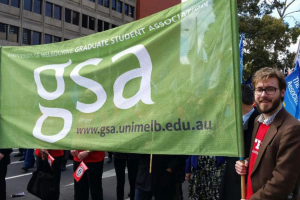GSA Assistive Technologies Library Accessibility Survey Report
Update as of July 2025:
The University has responded to GSA’s submission of the Assistive Technologies Library Accessibility Survey report by adopting several recommendations as ongoing initiatives. They aim to make accessibility the focus of library services, including through the following initiatives:
- Ensuring PDF subject readings uploaded to the LMS are accessible for people using assistive technologies
- Accessibility is key for the evaluation and selection of the new Library Management System and the new Subject Readings platform. These systems are expected to begin roll out in late 2025
- The University Librarian is advocating for stronger accessibility standards through the Group of Eight (Go8) Librarians and CAUL (Council of University Librarians), which negotiates large publisher licensing agreements. Their advocacy is focusing on embedding accessibility as a core criterion for content procurement across the university sector. For purchases outside of these deals, the Library is drafting accessibility assessment criteria to be included for purchasing decision matrices. Consultation is needed to ensure the draft criteria aligns with user needs.
- The University has completed an audit of accessibility features for subscribed eResource platforms. Work has begun to find solutions identified issues.
- The Library is investigating Hathi Trust’s Accessible Text Request Service as a potentially useful way to source alternate formats.
- The library continues to work closely with SEDS during the implementation of review recommendations to identify opportunities for increased accessibility to the library e-resources.
This is a huge win for graduate students who use assistive technologies and we thank everyone who took part in the survey and report to achieve these great outcomes! We also thank the University for actively addressing the concerns raised in the report. There is always more to do – we continue to advocate for graduate students to be actively involved in university actions to ensure the actions address student’s needs.
Background information:
Students and graduate researchers who rely on the use of assistive technologies such as screen readers or alternative input devices struggle to access library resources in an efficient and timely manner. This is largely due to the inaccessibility of websites and resources provided by publishers.
While the SEDS review will support the team in enhancing their offerings, having students rely solely on formatting services in the long run is not sustainable. Even when a document is accessible, the publisher’s website may itself be inaccessible or prohibitively difficult to navigate using assistive technology. This means that a document which would otherwise take a few minutes to find might take hours to access for someone who uses assistive tech.
This difference in time needed to access materials can have major impacts for student in aspects of life including accessing other work and work/life/study balance. It may also result in perceived performance or time management issues which can impact future opportunities and career.
The University of Melbourne’s Disability Inclusion Action Plan 2023-2026 includes the need to “Develop an approach to support researchers (graduate researchers and staff) with disability to engage in research on an equitable basis with their peers.” (p. 12).
Survey results:
GSA published a survey in September to October of 2024 to understand more about graduate students and graduate researchers who use assistive technologies such as screen readers. The survey received 7 responses from current or recent graduate students at the University of Melbourne who use assistive technologies. The results of this survey are not representative but highlight the nature of the accessibility issues faced by graduate students using assistive technologies. Key ideas from survey results included:
-
- All respondents used Mac Operating System (OS), indicating it is a key OS for new accessibility measures to be catered to.
- Respondents had a range of reasons why they need to use assistive technologies. Following the SEDS review, updating key systems and interfaces to ensure they are compatible with assistive technologies will be crucial.
- 67% of respondents reported facing issues or delays when using assistive technology to access library systems or resources. These impact on a student’s ability to do their work in set time frames.
- Systems and interfaces are inconsistent both within the University and externally from publishers in terms of their ability to meet access needs. Accessibility must be a core part of setting standards and upgrading systems.
Recommendations:
For the University of Melbourne
- Work with graduate students who use assistive technology to ensure that system and interface updates meet their needs.
- Establish minimum standards for all University-controlled publications (including academic content, LMS content, etc.) to ensure accessibility.
- Ensure the University’s interfaces and services are accessible for people using assistive technology.
- Ensure consistency in interfaces and as much possible ensure graduate students can access materials through one interface.
- Ensure the University’s systems and interfaces work well with Mac OS.
- Provide training to librarians on accessibility support for graduate students.
- Ensure all graduate students, including international students, have access to financial support to access assistive technology and associated costs (e.g. e-books).
For the University of Melbourne to advocate on
- Advocate to publishers for their resources and websites to be accessible for people using assistive technology.
- This includes ensuring complex figures, graphs, graphics and tables are entirely accessible.
- Ensure pdfs are tagged and alternatives to pdfs are easily accessible
- Advocate to the Australian Government for a redesign of the minimum standards for online resources and e-books to ensure they are accessible for people who use assistive technology.
These recommendations are in line with the University’s duties under the Equal Opportunity Act 2010 (Vic), which confers the positive duty to eliminate discrimination.
Support:
We acknowledge that this report will not be able to immediately address issues. If you require immediate support to access documents, please reach out to these supports:
- Student Disability and Equity Services (SEDS)
- For subject-specific issues and enquiries, the University has a list of Liaison Librarians for each Faculty.
- Information about Open Access for research such as journal articles and book chapters made open to everyone. Contact information for Open Access is also available.
- Information and support for Minerva Access, the University of Melbourne’s institutional repository for research outputs.
- You can consult a University of Melbourne librarian, or complete a library enquiries form for further library access support.
- Click the button below to read the full report.
Discover more work from the Policy and Advocacy team

UoM Protest Rule Changes report
GSA consulted the graduate student community at the University of Melbourne (UoM) to gather their feedback on the introduction of new University rules relating to protests on University premises.

GSA Graduate Workspaces report
GSA’s Education (Research) Officer for 2024-25, Scott Arthurson, developed this report highlighting graduate researchers’ workspace needs. GSA conducted a survey of 410 graduate researchers, a Townhall, and extensive consultation of our members.

GSA Assistive Technologies Library Accessibility Survey Report
Students and graduate researchers who rely on the use of assistive technologies such as screen readers or alternative input devices struggle to access library resources in an efficient and timely manner. This is largely due to the inaccessibility of websites and resources provided by publishers.

Inquiry into food security in Victoria for University of Melbourne stakeholders
GSA’s submission highlights the drivers and impacts of food insecurity among graduate students at the University of Melbourne, as well as the barriers they face when accessing food relief.